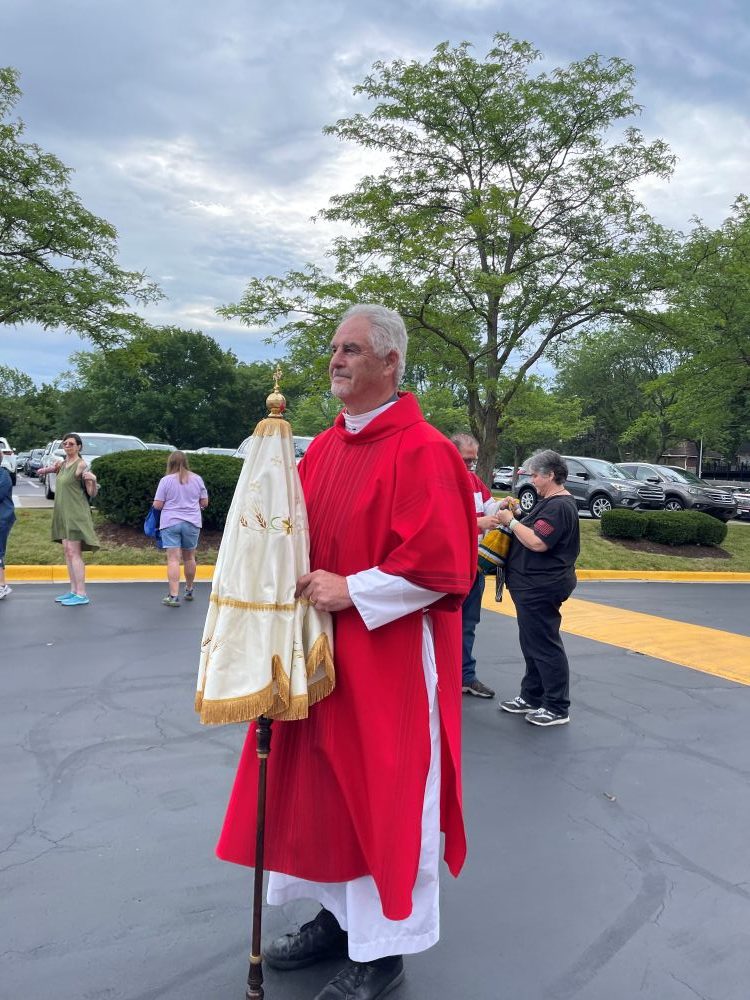
CSR 355 Deacon Jim Mullin Part 1
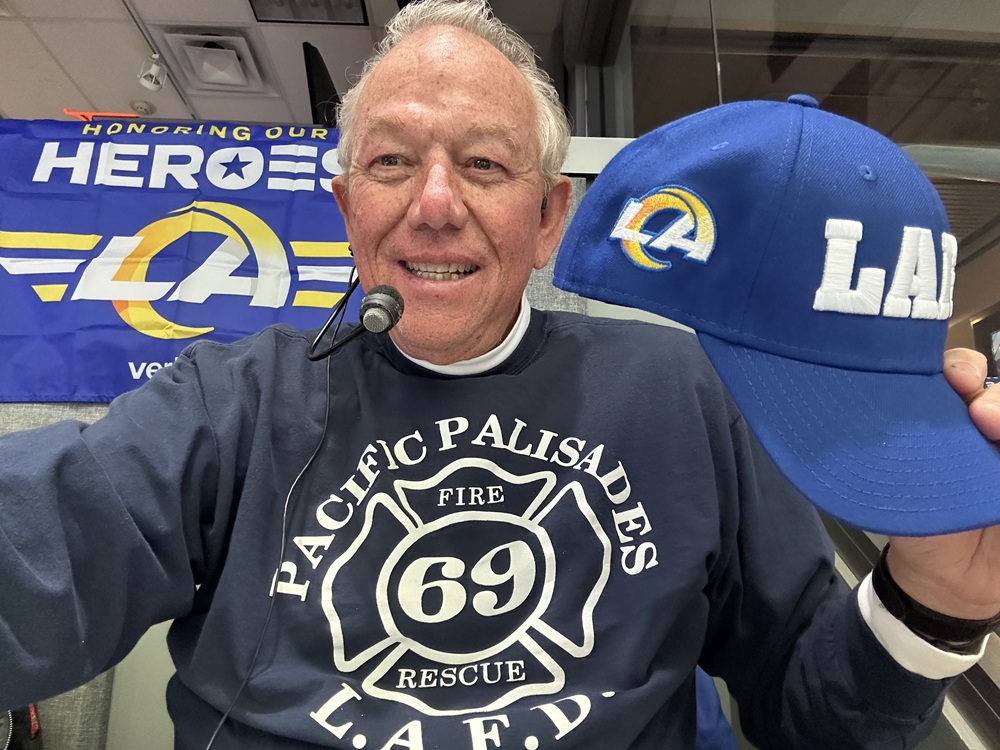
CSR 354 Sam Lagana
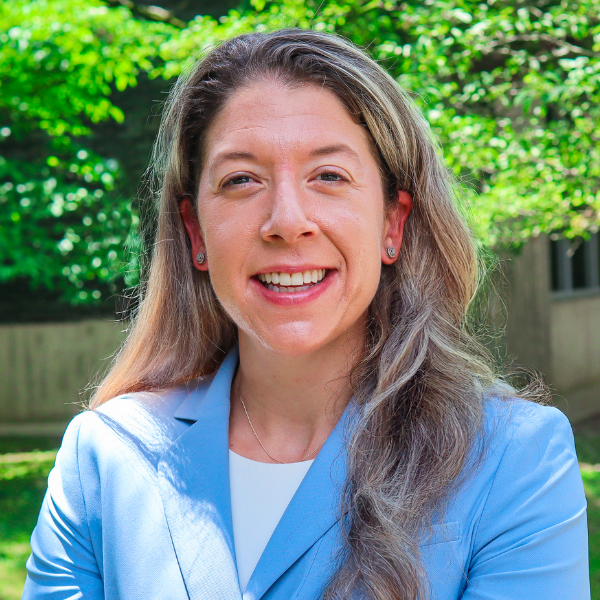
CSR 353 Marissa Muoio
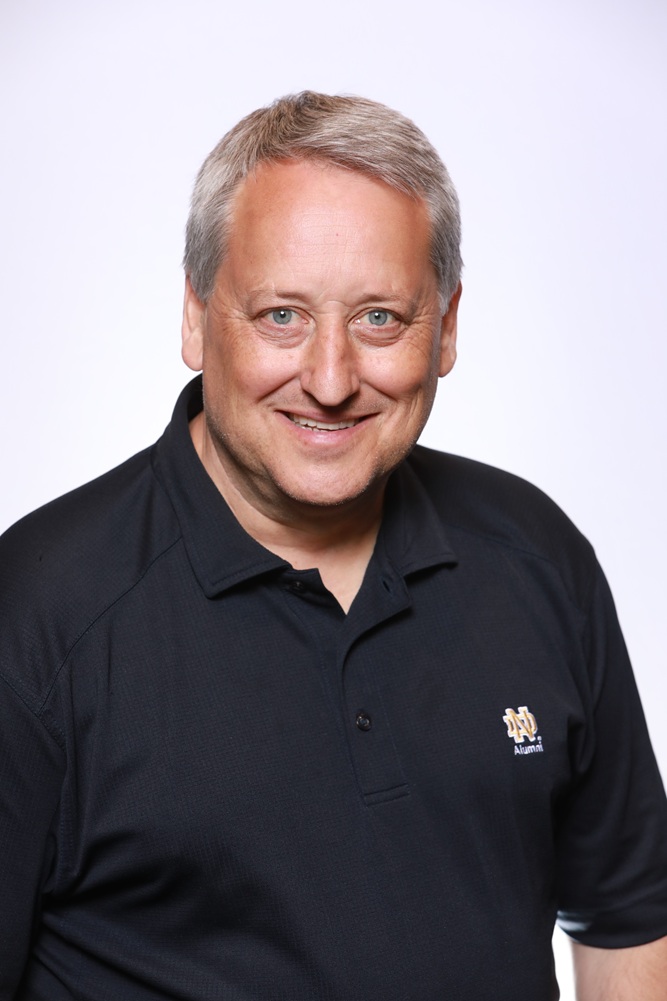
CSR 352 Len Clark
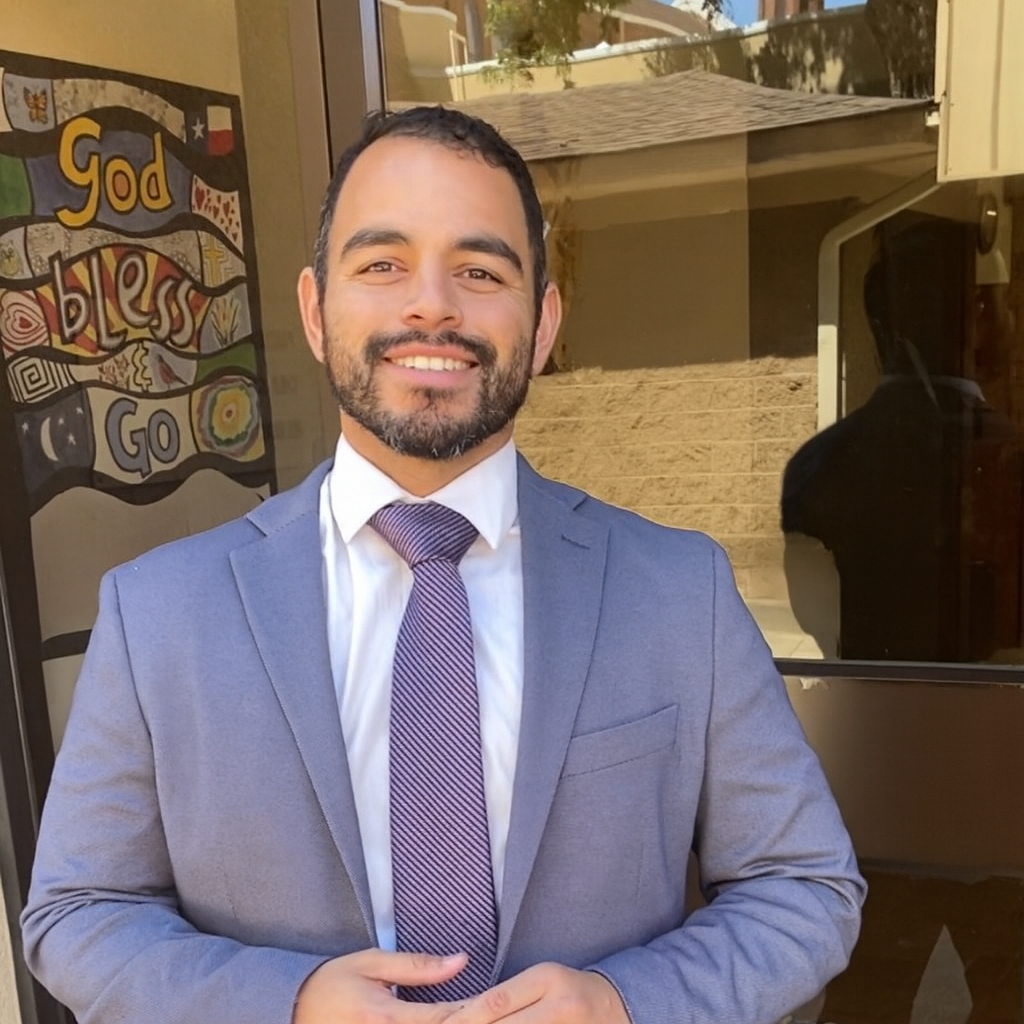
CSR 351 Dan Leonardi
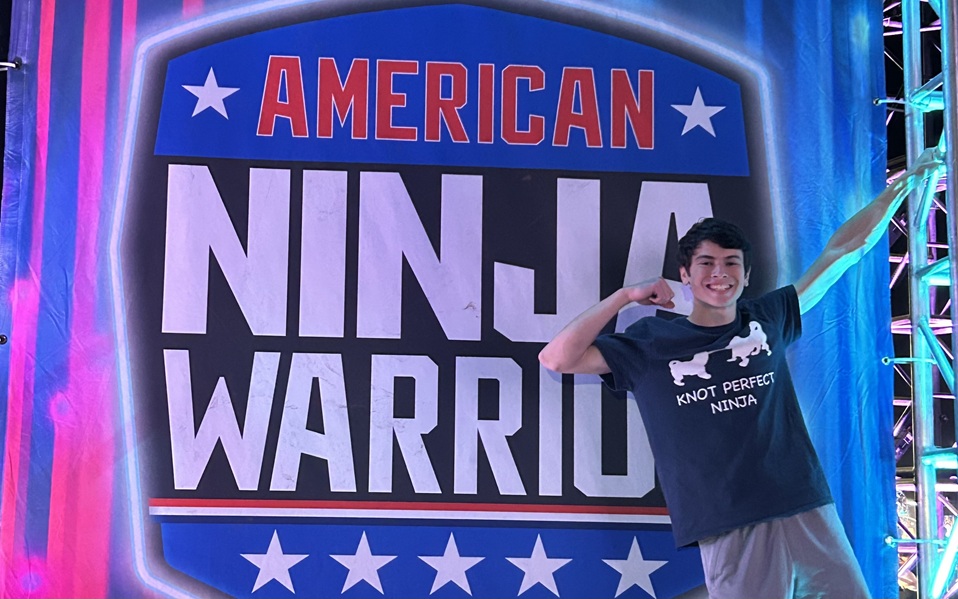
CSR 350 Austin Baron
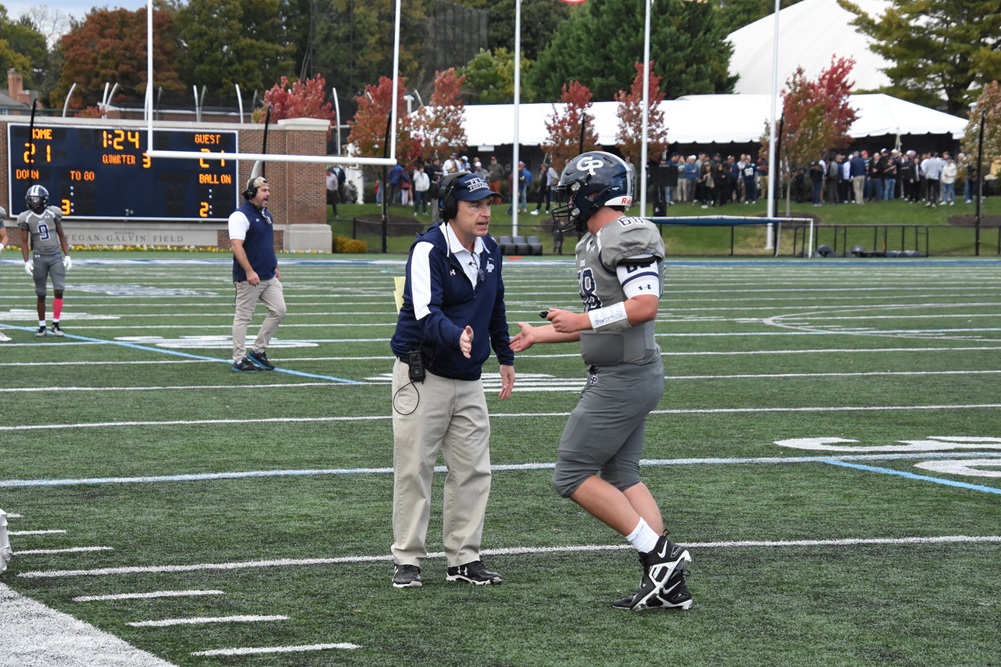







He played college football, first at William Penn University and then at Missouri Western State University, including playing in a combined total of three bowl games. After college he played club lacrosse for several years and became an avid cyclist and swimmer and even competed in two short-course triathlons. In high school he was team captain for varsity football and was a three-time Missouri state qualifier in swimming and senior year state qualifier in discus. On the faith side, he is a convert and serves as Deacon and Minister of Evangelization at the Church of the Nativity in Leawood, Kansas, and was recently appointed to the Archdiocese Synodal Team.
Notable guest quotes:
“My mom and dad helped start the church, but the neighbors, all the people that were there, we did things together as – now seeing what parish life is like – it was very much a parish family. They got together outside of Sunday worship. They did things all the time. We went camping together. We celebrated fourth of July holidays. It was a wonderful group of friends that they had and frankly it was a wonderful environment.”
“We led youth groups… We took some of the young people out skiing. It was actually just a phenomenal church … it’s a very good memory for me.”
“I leaned over to my wife who was really enjoying all the people sharing and I said, ‘I’m gonna get the kids’ – they were in the nursery and I said – ‘I’m gonna get the car. You can stay as long as you want.’ We were actually sitting on the very front (pew), so it wasn’t like I could just sneak out. But I got up and went back, got the kids, and she came out shortly afterwards.”
“It’s a nine-month process? What is this? RCIA, I had no clue what that was. But I agreed, for all the wrong reasons. I just said okay, that’s fine. If that’s what it takes to get into this church, that’s fine.”
“They started talking about the sacraments and they started with baptism and marriage, and I had felt like, wow, God was very, He was real. When our kids got baptized, I felt that God was part of that. I mean a real part of it. And our marriage, I felt God was active in our marriage and so when they started talking about, okay, God is actually really present and He’s doing something in what we call a sacrament, I’m… listening more intently. Then they got to the Eucharist and it just all came back to me, this me getting up because of the communion being canceled.”
“I had a conversation with the head pastor, the monsignor now, and he gave me some really great advice, because I said, ‘You know, I’ve got some questions.’ He says, ‘Jim, you’ve really been given a great gift. Let the Holy Spirit reveal all the answers to these things, in the right time.’ And he did, he has, which is ultimately how I eventually got into the Diaconate.”
“We were going through our first reconciliation and… I get in and I’m with the priest and … I tell him my sins and so he gives me penance and he said, ‘I want you to go open up the hymnal to a page number’ … in my football career, 51 was my number… middle linebacker… Psalm 51 became very close to me. It was what gave me confidence when I was lonely. And so, the priest gives me this penance to open up and read and there it is, create in me oh Lord a clean heart… Psalm 51.”
“It just opened my eyes to the dignity of people and how we’re all related.”
“He said, ‘You know Jim, being a deacon is not preaching or being up at the altar. It’s about service to people. What is your service? What’s God doing with you that’s service oriented’?”
Related link:
He is an established voice-over and on-air and venue announcer/sportscasting talent who is known for his voice presence at Los Angeles Rams football games since 2016. He traveled the nation and world as the on-site voice of AVP Beach Volleyball for most of the 1980s and 90s. Additionally, he announced tennis, volleyball, and roller hockey at The Forum in L.A. He has provided his voice for many commercials over 30 years and announced USC, Pepperdine, and CSUN collegiate basketball and Avengers Arena Football at Staples Center in the 80s, 90s, and 2000’s. He serves on the Boards of the John R. Wooden Award Foundation, the Los Angeles Sports and Entertainment Commission, and West Coast Sports Associates. He was the recipient of the 2025 Humanitarian Award from Catholic Charities.
Notable guest quotes:
“My father was raised in the Catholic tradition, my mother immigrated to it, and they raised us in a traditional Catholic environment at Corpus Christi Parish in Pacific Palisades… I was an altar server.”
“I don’t know how competitive I play, but the reality is I am competing today at my age in volleyball, in softball, in basketball.”
“I thought that I would be the next great multi-sport athlete until my back told me that was not going to be the case. In junior high I got hurt and I found out that I had … an extra lumbar in my lower vertebra and my … muscular skeletal system was not growing at the same pace as my body.”
“I was … going up for a rebound in basketball and I got low bridged in practice and I couldn’t move on the court when I was trying to get up and so that’s when they actually really identified my physical issue and they wanted me to stop playing.”
“There was another young woman who was on the girls’ basketball team and on the golf team and she was keeping the book and so I sat between them to announce these games and … she now is the governor of the Los Angeles Lakers, Jeanie Buss. That’s how I wound up getting into announcing.”
“I had served at Pepperdine (University) for nearly 20 years, which is a Christian institution and, interestingly, a significant number amount of the students are of the Catholic tradition.”
“Bringing people together in community is something that I believe in; togetherness, relationship, those are elements that I speak to quite often – faith, family, and friends.”
“I start my prayer always with thanks, giving thanks to the Lord… but then it’s also for me to ask how I can share goodness and happiness with other people.”
“Maybe even that’s how I picked up some of my announcing was doing readings, and the first reading I ever did has stayed with me and that is Corinthians thirteen… and in almost all my speaking engagements I continue to use this, and I have for most of my life.”
“The first day when I took on the leadership of CEO and president of Notre Dame High School… Mr. (Vin) Scully called me to congratulate me and chat with me.”
She coached for the New Jersey Pride softball organization and served as a private catching coach. In addition, she has coached bowling and volleyball. She had been the assistant varsity softball coach at Mount Saint Dominic Academy and played softball at Seton Hall University. As a student-athlete at Mount Saint Dominic Academy she had played volleyball, basketball, and softball. Presently she is the Director of Strategic Initiatives and Leadership at Stuart Country Day School of the Sacred Heart, a preschool to Grade 12 private school in Princeton, New Jersey designed just for girls.
Notable guest quotes:
“My family, really our Catholic faith is just critical to our family structure. My grandfather was a deacon in the Franciscan Order.”
“It’s very much a part of who I am. And my faith is critical and core to my own being.”
“Those are some of my most special memories that we had together, is time where he really would review scripture with me, sometimes read it aloud to me and then help me break it down alongside him, and share what message that he wanted his parishioners to walk away with.”
“Just getting to see women in professional sports at that age was a huge difference maker in my own path and career and passion for athletics.”
“I think again about that servant leadership mindset. What does it mean to lead quietly, to lead a life of faith, that, I think, just in your being and your presence alone is where people recognize or can see how your faith is your core.”
“I have one study… coming out later this year. I’m working with Dr. Monica Kowalski at the University of Notre Dame and that study was designed throughout our Sacred Heart Network. So, we had over 250 adolescent female participants looking at a research question around purpose and spirituality. So, we’re excited to share those findings later this year.”
“That’s where I was able to intertwine a lot of my faith… In that belief that we are going to, if we are working hard, we’re working to the best of our ability, we’re carrying ourselves with good character and integrity, that things will fall into the place that God has a place for us.”
“It’s something that I think we do really well is being present to how our spirituality really guides our students and our coaches. And it’s again, I come back to being, because I think that for so many it’s the love of Christ is shared through action and through our presence with one another.”
“One of my favorite priests is Father Richard Rohr. I’m a fan of the mystics and I do expose students to his daily meditations.”
Related link:
Stuart Country Day School of the Sacred Heart website
He specializes in covering Notre Dame athletics using emerging media technologies. He has been recognized as the Indiana Sportscaster of the Year by the National Sports Media Association, from which he also received the association’s national Powerade Award for his audio feature on the Notre Dame-USC football rivalry. Last year he authored the book, “Teddy and The Gipper: A Notre Dame Friendship,” and now his newest book is releasing, called, “Vision, Values, and Victories: Notre Dame-Style Leadership: Forging Champions in Faith, Character, and Commitment.” He was the guest on this show six-and-a-half years ago way back on Episode 11.
Notable guest quotes:
“With the release of chat GPT by Open AI a couple of years ago, that has really opened the floodgates of this new medium, if you will, that I have really adapted to because if I want to consider myself an educator of the next generation of multimedia journalists, I have to stay ahead of them and I have embraced it and am really having a lot of fun with it.”
“Adversity is part of life. It’s the way that you respond, and it’s been my Catholic faith that has really gotten me through some tough times, especially in the past couple of years.”
“I didn’t learn until four days before the Ireland game, after the Marcus Freeman press conference, that I was fired … and the first thing that went through my mind is, ‘How am I going to help my mother’?”
“The faith in Ireland is, it was refreshing. It reinvigorated my faith.”
“I said it would be great if I can tie in everything I like to do in Ireland. I like to walk the pilgrim paths, and I actually completed all the five pilgrim paths and received this Gaelic title for being … only the 8th American to do it.”
“In order to lead others, you have to learn how to lead yourself.”
“George Gipp almost drowned in the St. Joe River and was saved by Father Cornelius Haggerty because he didn’t know how to swim. Now, if he would have drowned, there wouldn’t be no ‘win one for the Gipper’.”
“Everything about a Notre Dame football game has a reference to the Catholic faith and that’s why every time I step back on campus you just have this feeling that you have to be bigger and better than yourself and be a person of service.”
Related link:
He has been playing soccer since the age of five, although in high school he also played travel baseball. Following four years of high school soccer he played the sport at Belmont Abbey College. He played rugby after college and made a semi-pro soccer team, plus he spent six years as a soccer referee and has spent time coaching in the sport as well. He also is presently in a competitive volleyball league. He is the Director of Advancement at The St. Austin School, which is a pre-K – 8 Catholic school in St. Louis.
Notable guest quotes:
“Cradle Catholic as they say, and my mother was actually a convert before my brother and I were born, and through that conversion experience she actually met my father and then they had us.”
“We were indeed raised Catholic. We were homeschooled for a majority of our elementary educational years with some Catholic Montessori mixed in… And then for high school my brother and I both went to Catholic high school.”
“We’re called to be formed mind, heart, and spirit.”
“I always love defending; defending the faith, defending on the soccer fields. Whatever the case may be.”
“We had to memorize 15 quotes that were about Catholic teaching on sports or very Christ-centered messages around being faithful and fit. The school’s motto was excellence in virtue. And those 15 quotes, we had to memorize those, and we would get quizzed on them before we could step onto the field.”
“We may lose a game, or we may get tackled and we may get hurt a little bit, but it’s persevering through that pain much like our Savior did on the cross and in his ministry.”
“The three hearts pilgrimage… it’s usually in October when they have it, and that pilgrimage is essentially maybe a smaller scale version of the Camino.”
“It’s fascinating that the Almighty in His infinite wisdom chose to make Himself manifest as man beyond our understanding and maybe a conversation we can enter to into Him with when we see him in the beatific vision, God willing, of course.”
“I’m sure Saint Joseph himself was physically fit and… I always love to picture Saint Joseph, yes, as the terror of demons but also if anything happened or any physical threat to the whole family came, he was more than ready and willing to defend them and protect them as he was so strong.”
“I was just recently talking to our girls volleyball team here at St Austin and the coaches wanted me to talk about how to be more Christ-centered in their games and in their huddles and when they’re talking to each other, so I said, ‘Girls, look at the cross’.”
“He had to carry His cross after He was beaten and with people berating Him and spitting on Him and hitting Him and He fell three times and had the cross land on Him with all His open wounds but He was physically fit, yes, and even more spiritually fit and He was performing the will of His father as we are all called to do.”
“I think, in His divine wisdom, the good Lord sends us things in our life that we cannot understand, and we don’t see the reason why they’re happening, and I learned that in college soccer specifically.”
Related link:
He appeared on Season 15 and Season 17 of American Ninja Warrior on NBC, having reached the finals and participated in the bracket of 32 athletes remaining. This year he competed in the Barbados Ninja Throwdown, after last year having competed in the USA National Championships. For two years now he has competed on the Ninja Sport Network in both Season 3 and Season 4. Since 2021 he has competed in the World Ninja League, seasons 7-11, all after having competed in four seasons of the Ultimate Ninja Athlete Association. In elementary school he had played soccer and CYO basketball, and then in high school started participating in ninja warrior competitions. He is currently a student at the University of Notre Dame, where he is regularly running, lifting, bouldering, and top roping on campus. Through it all, he is using his platform to advocate for an end to world hunger.
Notable guest quotes:
“I went from kindergarten to eighth grade to a Catholic school and religion was my favorite subject. I love just learning about my faith, learning about Jesus and His whole story.”
“In fourth grade I started altar serving and I just loved being able to serve the Lord. And then after going to a Catholic school from kindergarten to eighth grade, I went to a public high school and that’s really when I had to start taking responsibility for my faith and I made a priority of going to Mass, to daily Mass, at least once a week because that was something that was really important to me, because going to daily Mass is such a solid way to grow in your faith.”
“God blessed me with a friend who was thinking about becoming a priest in high school and seeing how much he knew about his faith really encouraged me to learn more about my faith.”
“I really just fell in love with the Ninja Warrior community because even though we’re competing against each other, everyone wants to see each other do the best on the course. They share their tips of how to do the obstacles, and it’s really just a wonderful supportive community.”
“My faith always comes first and I always … make it a priority to go to daily Mass because I want to continue to grow in my relationship with Jesus. And so, I always put my faith first.”
“It definitely does take like a lot of focus, but my faith comes along on the course with me. I keep a miraculous medal with me in my pocket when I run the course because I want to keep Mary close to me. I have a devotion to Mary, and I want to always be reminded of why I’m competing is to glorify God.”
“Feeding the hungry is … a corporal work of mercy that we talk about as Catholics and when I went to meal packing events in my parish when I was younger I just loved packing meals and getting to do (it) with my parish community and going to the meal packing events over the years I eventually learned that a billion people go to bed hungry each night and that the meals that I was packing with my own hands would be the only food for someone else to eat and that really impacted me and instilled a desire to want to help the hungry.”
“It was really beautiful just to see such an intense glow coming from her womb, but to me that was a reminder of Jesus’s light into the world and how we’re all called to share Jesus’s light with other people in the same way that Mary does.”
“God gives us all these gifts and talents, and they’re used best when they’re used to give glory to God and to love other people.”
“What I’ve noticed is that when people see you trying to do something good in the world and help others, they’ll be very supportive of you and God will bless you with your efforts.”
Related link:
Knot Perfect site (American Ninja Warrior content)
He played football, basketball and ran track, and then in high school played football, going on then to be on the football roster for Catholic University in Washington DC. He went on to become the offensive line coach at Georgetown Prep from 1984 through 2023, retired from coaching after the 2023 season, but came back this season to help the new offensive line coach transition from having been their tight ends coach. On top of all that, he also coached his own children in youth basketball and lacrosse. Along the way, in 2014 he received the John W. Voight award from the Maryland Football Coaches Association Hall of Fame, was inducted into the Georgetown Prep Sports Hall of Fame in 2019, and last year was a Georgetown Prep Insignis Medal Recipient, which is the school’s highest honor.
Notable guest quotes:
“We… went to church every Sunday at Holy Cross Parish… mom was in the choir for up until about 80 years old, up until about eleven years ago. Faith was always there for us. We went to Catholic schools as well.”
“I know if I had played and I’d stayed at Catholic (University) all four years, I would not have met my wife, would not have had the beautiful family that I have right now. So. in that regard, I do not regret having not played there.”
“I started realizing how I was brought up and the values and morals that I was taught from my parents, from the nuns and from the Jesuit priests and wanted to raise my children that same way.”
“I was probably 33, 34 years old and I hadn’t been in confession since the age of 17. We went to the school where my kids went and to the church and the line starts forming behind me. I tell these folks, ‘I haven’t been in 16 or 17 years’ and they quickly dispersed.”
“The priest asked if I had missed Mass in that time period. I said, ‘Yes, a couple of times,’ and I kind of said it flippantly like it was no big deal. But he got so angry that I was acting that way and really let me have it with both barrels and I left after doing my penance thinking, ‘My gosh, well, this priest doesn’t want people to come to confession because he really laid into me.’ But I got to tell you it worked because from that point on I didn’t miss Mass on Sundays and the holy days… he really got to me. So, I’m glad he was tough on me.”
“Here at Georgetown Prep … we’ve got team Mass. So, whether it’s a Friday game Saturday game we do a team Mass… and Coach Paro tells our guys every year that that is the most important thing we do as a team is our team Mass.”
“Our president now is our team chaplain. We’ve only had four team chaplains in 65 years and Father Van Dyke does a wonderful job. He is the only Jesuit here, the only priest here on campus, so he wears a lot of hats and he’s now our team chaplain and his message is always, ‘Look, I’m not going to say good luck to you but I’m going to say play well. We pray for ourselves not to get injured and for the other team as well and just to do our best.”
“The homily was about free will and that God gives us all free will and that unfortunately some people choose to do evil things with that free will. So, the timing couldn’t have been better, and it definitely was not a coincidence that that was preached that day.”
“We get to spend three hours a day with these guys, more than their parents, more than any teacher. So, we have a big influence on these young men and we have to be good examples.”
Related link: